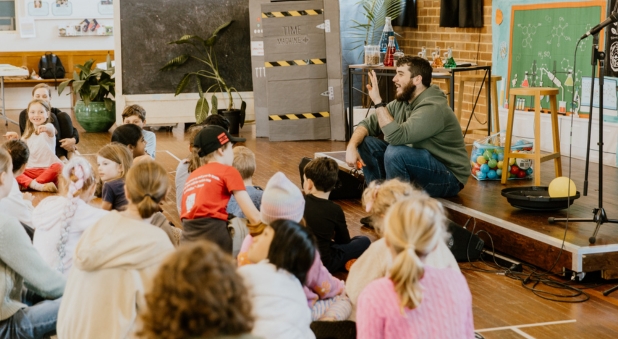Those who have kids in their family with disabilities know it can be hard to find a church where they’re as welcome as everyone else, and incorporated into the regular children’s and youth programs. This is something the parish of Canterbury with Hurlstone Park is determined to change, spearheaded by its kids’ and youth minister, Luke Graham.
The kids programs has grown by 300%
“It’s been such a beautiful, slightly wild ride for us,” he says. “When I started in 2020, there were about 70 adults and I had about 30 kids from zero to 18. This Sunday we had about 200 adults and across our programs now we have about 90 kids. God has done some incredible things here and he’s drawing people to himself.”
Mr Graham has been leading kids and youth in churches since he was 17. He has a real passion for supporting kids with disability – particularly those with autism, after his first role as a junior leader was to take special care of an autistic boy.
“I just remember really wanting him to be a part of things and get to hear the gospel,” he recalls. “It was easy to, I guess, distract him and not make him a part of what was happening… [and] I don’t think that was my church’s plan at all, but I didn’t really have a skill set to know what to do well.”
Mr Graham’s jobs during his university years were in the disability sphere, and he wondered what it would look like for those children to be at church and be part of a church, and whether churches would have space for them.
So, once at Canterbury, he prayed, “Lord, there are no kids with autism at my church!” Naturally, before too long, “God provided us with plenty, and we have needed to build systems around their needs”.
What this means in practice is training for the leaders, consultation with parents about what their kids need, engagement with the kids in positive but simple ways, and providing clarity about programs so everyone knows what’s happening.
.jpg)
“We’ve created a form that we sit down and walk through with parents that asks things like, ‘What does a good day with your kid look like? What does a bad day look like from your experience?’ We’ve tried to keep it fairly strength-oriented: what are they good at, what are they interested in, what are things we can do to help them engage and manage well? It’s just acknowledging that those kids have a different way of processing the world.”
The kids’ team has created a visual timetable so everyone knows what’s coming up. Parents have the roster so they can tell their children that week’s plan, which lowers anxiety, and the team is also keen to get photos of all the leaders.
“[Parents] feel like there’s a place for their kids here, they can talk to other parents about their particular struggles and know that people are on their team,” Mr Graham says. “And when things have gone wrong – violent meltdowns or things like that – there’s been a real attitude of grace, a willingness to repair relationships and not take things personally.
“I really want that to be the thing our church says to everyone – that we can say we really love having you here and we want to make this work as best we can."
How can we love you? How can we make you safe so you can grow to be more like Jesus and be loved and known, and where you can serve and contribute? We want to do that with all our services. We are trying to be a church for all and really mean that when we say it.”
Breakout
In response to ministry staff from other parishes wanting to support and love young people with disability better, Mr Graham started the Accessible Kids & Youth Ministry group on Facebook last year with Youthworks’ disability advisor Bec Baines.
“Almost every kids’ and youth minister that we spoke to also desperately wanted to make space for people who are on the spectrum or have ADHD and they felt out of their depth, so we’re really excited to contribute to something like that,” he says.
“We had so many people who are keen and passionate, so we started the group for them to come and share their stories and struggles.
“And, of course, people in ministry talk, so other people have found out about the group! We now have a member in Tasmania who wants to start an adult service for people with sensory needs and talk about what that would look like. Bec helps connect us with experts who can contribute into that space.”
Mr Graham says he is excited to see how other churches are thinking through the issues. “Someone in this group says, ‘Oh, my gosh, what do I do with someone who has dyslexia? How do I help them read the Bible?’ And that’s great, because it means that this person is in the church, and a group of people who are more attuned to them are there, and that gives me so much delight.”
Pray
- that more young people from all backgrounds and abilities might have the space to hear about Jesus and learn to love and cherish him more.
- for the team that will look after kids in Canterbury’s planned “calm” room; that they will disciple these young people well.
- for the Accessible Kids’ and Youth Ministry network as churches across Sydney and beyond think about how to make space for disabled people.
- that the church attendance of people with disability won’t drop away in later youth and adulthood.
- that every church might be a place where disabled people can encounter the gospel.























